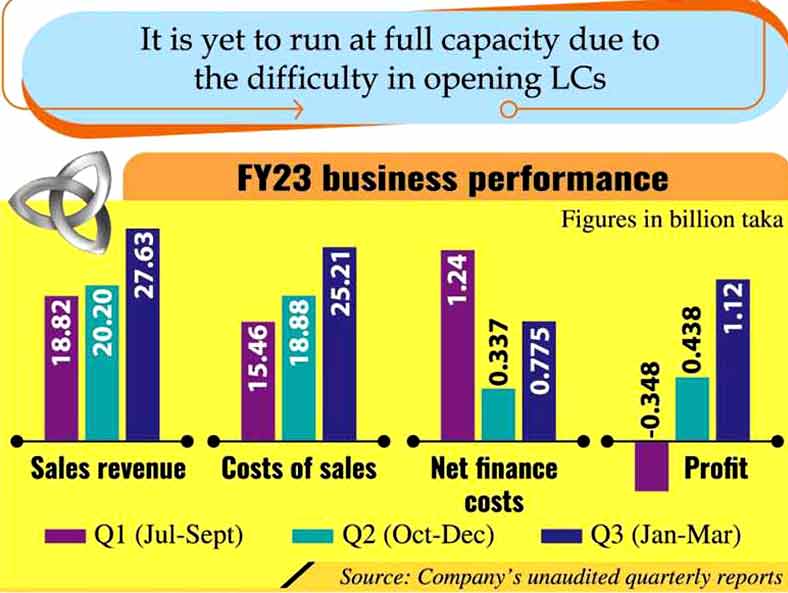BSRM comes out of red in Jan-Mar, riding on high demand, increased product prices

Published :
Updated :

Bangladesh Steel Re-Rolling Mills has crept out of losses in the nine months through March 2023, thanks to higher sales revenue and increased rod prices.
The Chattogram-based steel maker did better in the latest quarter through March. Its consolidated net profit went up to Tk 1.59 billion in the latest quarter, which helped the company to overcome its loss in the previous six months, according to the un-audited financial statements.
The company's consolidated net profit stood at Tk 495 million in the nine months of FY23. It incurred losses amounting to Tk 1.10 billion in the first six months through December 2022 despite profit in the second quarter.
BSRM, the country's largest steel manufacturer that accounts for more than 25 per cent market share, saw its sales revenue soar by 65 per cent year-on-year to Tk 39.24 billion in the January-March quarter due to an increased demand as well as price hike of MS rod.
It has been selling 60-grade MS rod at Tk 100,000 per tonne at the mill gate since early March, up from Tk 95000, after price adjustment in keeping with the growing input costs.
The price was adjusted due to abnormally high production costs, said Tapan Sengupta, deputy managing director of BSRM.
The company's production costs surged 61 per cent in the latest quarter. It managed to offset some of the costs by increasing the selling prices.
The steel maker imports 90 per cent of the scrap steel used. So, production costs escalated in line with the higher dollar price and the recent hikes in fuel and energy prices, said Mr Sengupta.
The US dollar has appreciated by about 25 per cent against the taka since the Russia-Ukraine war began in February last year.
The stronger dollar pushed up the net finance cost by more than 11 times year-on-year in the nine months through March 2023. The finance cost was much higher in the first quarter than in the second and third quarters.
In the first quarter, steel makers had to settle letters of credit (LCs) at Tk 112 per US dollar to import raw materials although the official dollar rate was around Tk 100.
Later on, the government took belt-tightening measures in order to protect foreign exchange reserves. As a result, the company faced difficulty in opening LCs, which squeezed imports as well as finance costs in the second quarter.
Also, the central bank warned some of the banks against selling dollars at higher prices taking the advantage of the dollar shortage.
Presently, banks cannot charge as they wish due to strong monitoring by the central bank.
Meanwhile, raw material prices eased a bit in the recent months in the international market, which brought down the finance costs to some extent.
Businesses in Bangladesh are still finding it difficult to open LCs since banks cannot supply dollars needed to finance imports.
BSRM has also been struggling to open LCs for imports, which is why it cannot run at full capacity, said Mr Sengupta.
The steel maker's sales revenue jumped 42 per cent year-on-year to Tk 82.91 billion in the nine months of FY23 while the production costs went up 44 per cent to Tk 76.75 billion.
As the prices of MS rod rose, the sales value was higher. The MS rod, the key construction material, became 12-15 per cent costlier in the past six months in the wholesale market.
The stock has been languishing at the floor price of Tk 90 since October 30 last year.
BSRM Steels
A concern of BSRM that engaged in the same business of making various construction rods also reported 8.74 per cent year-on-year rise in profit to Tk 1.12 billion for the January-March quarter.
The company raked in a profit of Tk 1.21 billion in the nine months through March while sales revenue rose 28 per cent to Tk 64.65 billion during the period.
It has been stuck at the floor price of Tk 63.90 since November 10 last year.
There are about 40 active steel manufacturers with a combined capacity to produce more than 10 million tonnes of steel a year. The steel industry in Bangladesh is worth Tk 550 billion, according to the Bangladesh Steel Manufacturers Association (BSMA).
The annual demand for steel in Bangladesh is 7.50 to 8.0 million tonnes and BSRM, Abul Khair Steel, GPH Steel and KSRM meet more than half of the annual demand.
babulfexpress@gmail.com


 For all latest news, follow The Financial Express Google News channel.
For all latest news, follow The Financial Express Google News channel.